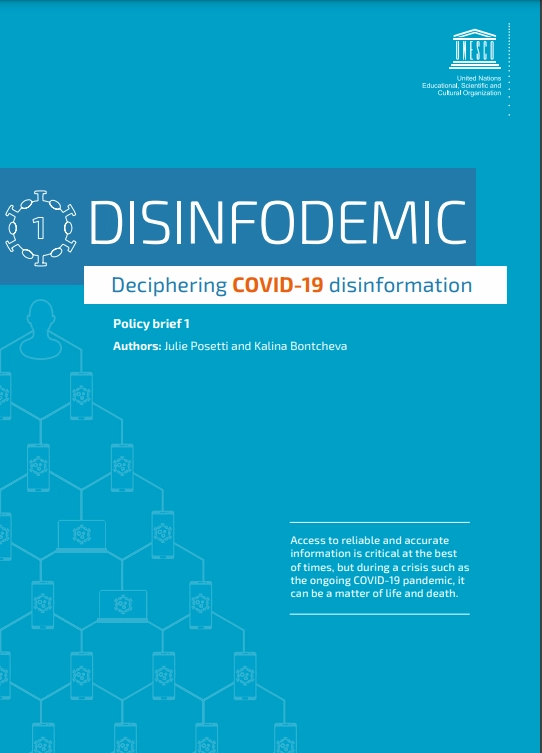

Misinformation About COVID-19 and Startups that Fight It
Against the backdrop of a real pandemic that is spreading around the world, according to the World Health Organization, a so-called infodemic has erupted. This is the spread of an excessive amount of information about the COVID-19 pandemic. In some cases, the information is true but mostly false.
WHO is making efforts to slow down the spread of the coronavirus disease outbreak. However, the global pandemic of misinformation spreads faster than the coronavirus itself through social media platforms and other information sources. This poses a serious problem for people. Rumors circulating by social media are provoking fear, panic, xenophobia, and racism - especially against Asians and Asian-Americans. Moreover, they affect mental health and can increase the feeling of anxiety and OCD.
There is a huge amount of articles and videos about the mysterious coronavirus as a new biological weapon in social networks. The worst part of it is that COVID-19 misinformation is spread by the media and sometimes government officials whose words the media replicate.
Such an outbreak of misinformation manifests itself in the following ways: fake information about the real situation that, apart from being false and unscientific, also tries to elevate itself through morbid moods; false information about treatment and prevention methods; accusing the WHO and scientific sources of lying or conceiving important information about disease.
Dangers of misinformation about COVID-19
Misinformation is dangerous not only for mental health but also for a physical one. Dangerous information about the treatment of COVID-19 with antibiotics, antivirals, or immunomodulators, which are not only ineffective but also pose a real threat to health, is circulating on the Internet.
The term "clip thinking" promptly gains popularity in recent years. People use it to describe the way a new generation perceives data. An unusually fast rate of life characterizes the 21st century. Trying to keep up with it, people lose skills of going deeper and pay attention to the superficial facts only. It’s believed that the superficiality of perception allows making the modern person believe in almost anything. People aren't capable of resisting the information flow — or at the very least they have to be specifically taught to do so and/or initially interested in it. Also, They’d trust information if it comes from someone in their inner circle — someone they already trust; if it aligns with their values, biases, and political views; or if it speculates on fears and anxieties they already have. Fact-checking information isn’t common.
Clip thinking became a serious challenge during the pandemic. In the address made before a global lockdown, the World Health Organization head proclaimed that misinformation about coronavirus can be more dangerous, than the infection itself. In this speech, doctor Ghebreyesus underlined that fighting against rumors and misinformation is an essential part of the battle against this virus.
Many people believe in at least one conspiracy theory about the origin of coronavirus. Many are convinced that the COVID-19 virus is a creation of a Chinese laboratory. Some generally doubt the existence of the virus; such people are called covid dissidents. They believe that the whole epic with a pandemic is completely false. Conspiracy theories adepts in some countries are even burning 5G cell towers, as they are convinced they help spread the COVID-19 disease.

The motivation of startups that fight Covid-19 related fraud
Ideally, governments should make sure scientific and helpful information from health ministry officials or scientists reaches all, even those who are skeptical about it. Sadly, governments often are lying about COVID-19 themselves or their efforts on that part aren’t as profound as they could have been. This is why big tech companies and development for digital healthcare startups are helping them direct people to truthful information — and while it’s often not enough to prevent the spread, they’re still a huge help.
Thanks to previous information crises, many global technology companies have been ready to stop the spread of misinformation. With the outbreak of the pandemic, Google, Facebook, Twitter, Pinterest, and others have started COVID-19 fraud-fighting. Search queries and social media feeds around the world were filled with verified information about coronavirus.
But what motivates all those startups that fight Covid-19 misinformation? First of all, the more truthful information can be found on this or that platform, the more popular it is. Besides, providing people with lies actively harms their health and that’s not something businesses should encourage. Fighting COVID-19 misinformation is something businesses are obliged to do to prevent their platform from turning into a weapon.
Healthcare startups and the healthcare industry, in general, are trying to provide people with truthful, science-based facts about the pandemic to avoid panic and misinformation. Here is the list of startups that fight misinformation.
News.Check - a startup based in the US. The platform checks news with the help of human and machine collaboration. Their solution teaches and motivates users to know whether the information is true and how to share it right with others.
Blackbird.ai is another US-based startup. This is a company that tracks misinformation online campaigns. They use both human and artificial intelligence to fight disinformation. They were the ones who noticed lots of fake information about 5G cell towers.
Primas is a startup from Singapore that desires to improve content quality. It focuses on low-quality content, fake news, and plagiarism. They use blockchain, big data, and NLP to find, detect and inform people about any fake or stolen content.
Cyabra is an Israeli startup that protects from disinformation and deep fakes. Their team uses NLP and deep learning. They know how to make the digital world authentic by applying a “truth filter”. Cyabra is aimed to make the Internet a safer place.
Logically.ai is a startup from Great Britain. This is an app that checks all articles that are being published. To identify and fight misinformation or harmful content, they blend together AI, OSINT investigators, and a huge fact-checking team.
Conclusion - misinformation COVID-19 and startups
Nowadays, humanity is facing a threat we never faced before. COVID-19 has changed the lives of all of us. Understandably, it made us reexamine our lives, understand our top values, and care about our health and safety more than ever. All of us wash our hands regularly, take vitamins, wear protective masks to reduce the chances of getting infected. But is that enough to protect your overall health?
Not only the physical aspect of our safety matters. We spend lots of time browsing the Internet, where people find various theories and curing methods. Some are good, but some may lead to disastrous consequences. So, it's essential to use critical thinking not to believe in anything you see on the Internet.
Both large tech companies and startups are trying to reduce the number of doubtful information. Absurd treatments, paradoxical conspiracy theories, fake photo reports, and statistics are seen daily by millions of people, which may be even worse than a pandemic itself. Technology is already a tool for spreading these; it’s only right to try balancing and overcoming bad agents while using it to fact-check and help people find the truth.
Tell us about your project
Fill out the form or contact us

Tell us about your project
Thank you
Your submission is received and we will contact you soon
Follow us

